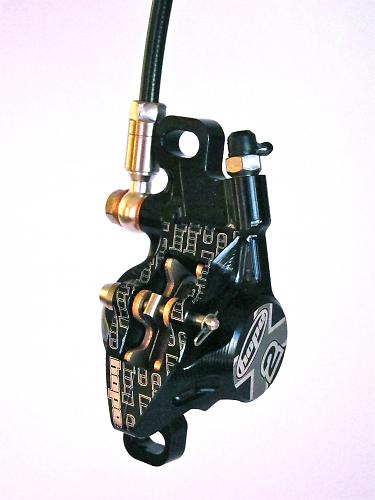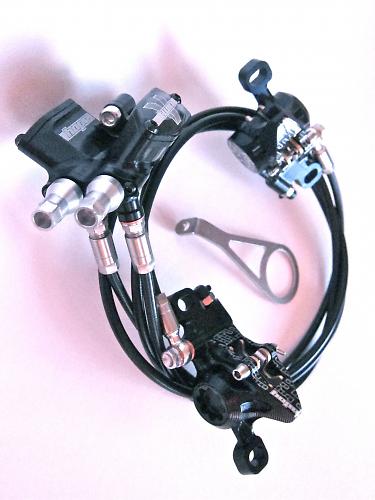- News
- Reviews
- Bikes
- Accessories
- Accessories - misc
- Computer mounts
- Bags
- Bar ends
- Bike bags & cases
- Bottle cages
- Bottles
- Cameras
- Car racks
- Child seats
- Computers
- Glasses
- GPS units
- Helmets
- Lights - front
- Lights - rear
- Lights - sets
- Locks
- Mirrors
- Mudguards
- Racks
- Pumps & CO2 inflators
- Puncture kits
- Reflectives
- Smart watches
- Stands and racks
- Trailers
- Clothing
- Components
- Bar tape & grips
- Bottom brackets
- Brake & gear cables
- Brake & STI levers
- Brake pads & spares
- Brakes
- Cassettes & freewheels
- Chains
- Chainsets & chainrings
- Derailleurs - front
- Derailleurs - rear
- Forks
- Gear levers & shifters
- Groupsets
- Handlebars & extensions
- Headsets
- Hubs
- Inner tubes
- Pedals
- Quick releases & skewers
- Saddles
- Seatposts
- Stems
- Wheels
- Tyres
- Health, fitness and nutrition
- Tools and workshop
- Miscellaneous
- Cross country mountain bikes
- Tubeless valves
- Buyers Guides
- Features
- Forum
- Recommends
- Podcast
TECH NEWS
Just In – Hope V-Twin
More and more cyclo-cross bikes are emerging with disc-mounts fitted as standard nowadays, some with cantilever mounts as well just to hedge their braking bets, some colours-to-the-mast disc-specific. Discs have yet to make any impact on the Pro cross ranks, but there are legions of riders who use their cyclo-cross bikes for a mix of racing and commuting and misbehaving off-road and the odd up and coming CX Sportive and like the braking force, predictability and lack of rim wear that discs can bring and see those benefits as a practical trade-off for the added weight over cantilevers.
While we’re waiting for the big boys to sort themselves out (which has been “soon, honest” for quite a while now) and bring us an integrated drop-bar disc brake system riders have to put up with cable discs and their imperfections or pick from the tiny selection of converters that allow a cable brake lever to work with a hydraulic calliper, such as this Hope V-Twin.

Hope have been making mountainbike discs for years so they should know what they’re doing, the V-Twin converter is CNC machined in Barnoldswick and the transition from cable to hydraulic is achieved with an extremely simple piston system, removing the need for the complicated levers that some other systems use. The V-Twin master cylinder is connected via pre-bled hoses to Hope’s X2 callipers, a one-piece design for low weight with high stiffness. It comes with a mounting bracket to fit the master cylinder under the stem, which is made out of a thin metal so it takes up minimal ahead space.

For your £260 you get the master cylinder, front and rear callipers, brake hoses and headset fixings in a system that tips the scales at 448g, a weight that will make the ‘cross purists wince and others point at the bulky nests of mud, grass and leaves that can gather round cantilevers, and the ability to stop at will. A pair of Hope 160mm rotors will add a further 91g and £38 each to the package.
The V-Twin has been performing well in the hands of Hope team cyclo-cross riders, winning both normal painful CX races and the especially painful Three Peaks, and now this one is going on the Winter Project. We’ll let you know how it goes, or stops.
Jo Burt has spent the majority of his life riding bikes, drawing bikes and writing about bikes. When he's not scribbling pictures for the whole gamut of cycling media he writes words about them for road.cc and when he's not doing either of those he's pedaling. Then in whatever spare minutes there are in between he's agonizing over getting his socks, cycling cap and bar-tape to coordinate just so. And is quietly disappointed that yours don't He rides and races road bikes a bit, cyclo-cross bikes a lot and mountainbikes a fair bit too. Would rather be up a mountain.
Latest Comments
- mdavidford 7 min 8 sec ago
Except that layout's clearly not appropriate for cyclists leaving and joining the road there. Obviously the real problem here is that people...
- alchemilla 6 min 49 sec ago
Useless for us weak-armed females, those with electric bikes, or panniers or baskets, or anyone who is short, who would never be able to lift them...
- fenix 11 min 10 sec ago
Champions are allowed to keep their rainbow bands on their neck and sleeves though?...
- Hirsute 14 min 5 sec ago
Not following that one. Why would the barrel adjuster now be out of alignment ? Unless your sprockets are too worn.
- chrisonabike 40 min 47 sec ago
Otherwise law-abiding...
- chrisonabike 57 min 28 sec ago
Absolutely. Even in places with efficient parking enforcement or - like London and now Edinburgh - where they have decided it's not legally on -...
- Lamb Henry 1 hour 39 min ago
I often wonder with my own cycling how much energy I could be wasting due to poor souplesse. Is the control of my leg muscles perfectly synced, or...
- Legin 2 hours 31 min ago
The planned tarrifs and boycott of American produced goods will be an interesting watch over the next year or so.
- Hirsute 2 hours 31 min ago
I'm not really sure exactly what I think about the fairness of transgender folk in sport but I do know that hating them is not an option and where...
- GMBasix 5 hours 33 min ago
A pair of aero belay glasses would suffice



Add new comment
14 comments
I find that BB7s are immeasurably improved by fitting compression-free outer cables like the Jagwire Ripcord. You don't have to set the pads as close and they give much better modulation
BB7's are a bit of a PITA IMO, you have to have them set extremely close to the disc otherwise you can pull back the brake lever to the bars (at least with a 5600 105). I find it's that close that when you're torquing up the caliper bolts it can shift slightly and cause it to rub so you have to start with it slightly skewed and hope the tightening straightens it. I find hydraulics much easier to align, although granted bleeding isn't much fun.
All braking systems have issues if improperly fitted, set-up and above all maintained.
In the aircraft industry they have used "hybrid" systems such as this for years, all the issues have been identified and with the correct installation and maintenance procedures they can be easily overcome.
The real issue about fitting hydraulic disc brake systems to road bikes and cyclocross bikes is going to be the overall weight of the system without any detrimental effect on braking efficiency.....now that is going to be the biggest issue to resolve and I can't wait to see how they do that!
Funny after riding mtb for 13 years 11 of which with disks, I have never no never had a problem with the disks that wasn't user induced (wrapped rotor, bad maintenance and so on).
Mechanical brakes rub because most of people (including bike mechanics) don't know how to set them up properly. Once the caliper is centred and pads adjusted there is NOTHING TO RUB especially that you can have a gap as small or large as you like.
Hydraulic brakes rub because sooner or later one piston will start pushing/retracting more slowly than the other one so theoretically self-centering system won't be really centering itself.
It's based both on my personal and bike shop experience.
P.S. I agree that almost all mechanical brakes are rubbish but BB7s are a viable alternative to many hydraulic systems.
hmmm, yeah, what Dave said, in however many years it is i've been using hydraulic disc brakes i've never experienced temperamental o-rings, whatever that may mean, or much in the way of brake rub, which has usually been down to a warped rotor anyway, and they do indeed perform considerably better in setup, power and modulation than any cable actuated disc.
i can alway tell when someone has a cable disc on their bike, because you can hear the rotor rubbing as they tootle along, which only ceases when they stop to fiddle with the adjustment knob, again.
cable contamination shouldn't be much of an issue with the Hope V-Twin either as it will be running under the tape to emerge for only a couple of inches before it slots straight into the adapter, but let's see
V-TwinBrakeImg.jpg
If only it did slot straight in. Unfortunately each cable makes an awkwardly tight 90º turn in order to get there, adding a final dose of friction and sag before handing over to hydraulic efficiency.
Why oh why couldn't they simply have those two cylinders pointing opposite directions so both cables could slot straight in?
Has nobody told Hope that Shimano cables also go under the bar tape now?
So people who frown upon cable disc brakes buy converters that use cables to operate their hydraulic brakes... Brilliant
P.S. Re: "... cables sensitive to water and grit contamination, non-centreing leading to disc rub, heavy..."
Quality full length cables will last over a season of everyday cycling. Once the cable is "stretched" you won't need to touch it.
BB7s and many other brakes WILL NOT rub once they are adjusted correctly as only one pad moves. You only need a single click on each adjustment knob every few weeks or months to compensate for the pad wear. That's the whole "adjustment" that BB7s require.
You'll find that hydraulic brakes with their very narrow gaps and temperamental o-rings will rub more often and more unpredictably and once the piston(s) get sticky you have a problem.
i won't find that. or, at least, i haven't. good self-centering hydraulic discs are better than any mechanical discs i've tried, in terms of setup, power and modulation. the only mechanical discs i'd consider fitting are BB7s, and they're not as good as a basic Deore-level hydraulic disc in my experience.
I have no idea what I'm looking at!
Presumably these are brakes?
How about a shot in context for those of us (am I alone in this) who are still using canti blocks, but who might still like to dream of a better tomorrow.
Of course, when the sun comes out tomorrow (bet your bottom dollar), I'll be safe again with my rusty old grabbers.
Still, please show me these gizmos on the bike.
What will they think of next?
I like Hope, but this is a bad engineering solution because it combines cable and hydraulic - leaving the rider with the weaknesses of both systems. Cable gives friction and vulnerability to dirt/wet, hydraulics are heavy and not intuitive to maintain (to many people).
Come on Hope, make your own road lever!
Have check through this page - looks like every concievable permutation of BB7 setups & weights you could imagine, including cable & housing weights by the inch
http://forums.mtbr.com/brake-time/definitive-avid-bb7-weight-thread-3656...
How does the weight compare to an Avid BB-7 setup?
I'm also interested to hear what the imperfections of cable discs are.
Looking forward to the verdict on these!
cables sensitive to water and grit contamination
non-centreing leading to disc rub
heavy